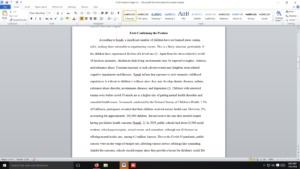Students’ well-being and learning
A position paper is an essay that identifies claims and arguments surrounding an issue. You will often be asked to compose papers that do this; it is a fundamental part of conversation surrounding any number of topics and a necessary skill in academic and professional writing. Composing a position paper asks you to carefully consider all sides of an issue before choosing one. Using your reading of the articles above, you will select one and take a position on some aspect of this debate: Has remote learning contributed positively or negatively to students’ well-being and learning? Are schools taking appropriate actions to facilitate learning and overall mental well-being of students? Should schools remain closed for in-person learning, or should they re-open?
Keep in mind, in crafting your position in response to that question, you will need to lay out some background. What position or viewpoint are you responding to? You can use issues or information raised in these articles to do any of the following:
- summarize the position you are responding to
- provide evidence or reasoning for your own position
There is no expectation that you will conduct additional research on this topic; you should have enough information to develop a position after reading the articles within this module (and considering your own experiences on this topic, as well). However, if you do choose to refer to other articles you may have read, just be sure to cite them.
Requirements
- All essays should follow the classical model as described in the Structuring an Argument section of this module.
- The final paper should be around four pages in length.
- Any sources must be attributed and cited properly in MLA format, including in-text citations and a Works Cited page.
Requirements: 4 pages
Answer preview
According to Sonali, a significant number of children have not learned stress coping skills, making them vulnerable to experiencing trauma. This is a likely situation, particularly if the children have experienced the loss of a loved one (1). Apart from the stress related to covid-19 isolation measures, children in their living environments may be exposed to neglect, violence, and substance abuse. Constant exposure to such adverse events may heighten stress-related cognitive impairment and illnesses. Sonali inform that exposure to such traumatic childhood experiences is a threat to children’s wellness since they may develop chronic diseases, asthma, substance abuse disorder, autoimmune diseases, and depression (2). Children with untreated trauma even before covid-19 struck are at a higher risk of getting mental health disorders and comorbid health issues.
[1250 Words]

Students’ well-being and learning

